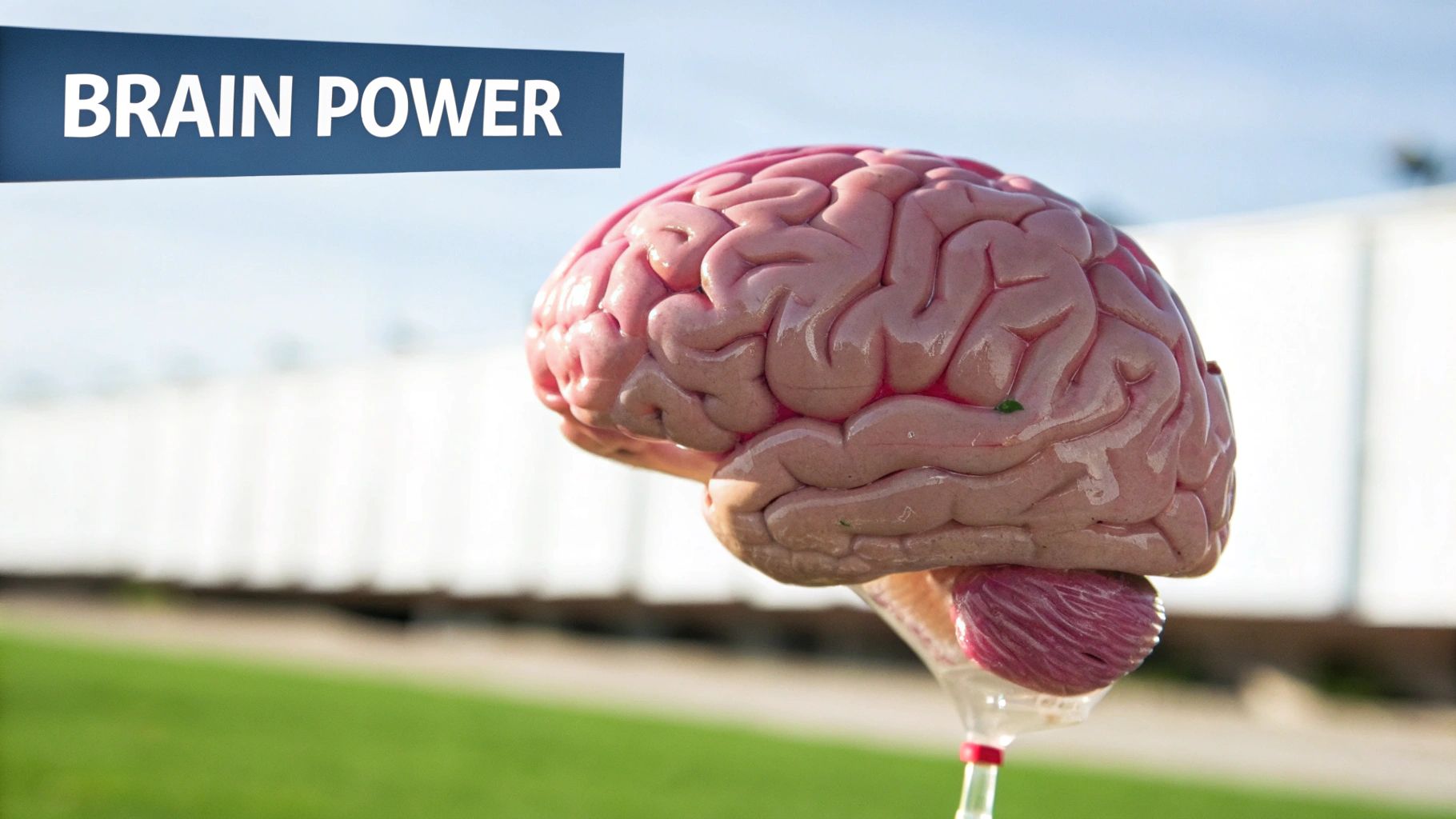Unlocking the Power of Trace Minerals
Discover the vital role of trace minerals in supporting your overall health and well-being. This listicle explores seven key benefits of trace minerals, from boosting energy levels and strengthening your immune system to enhancing brain function and protecting against cellular damage. Whether you're a fitness enthusiast, a busy professional, or simply seeking optimal health, understanding the impact of these essential nutrients is crucial. Learn how trace minerals can help you achieve peak performance and vitality.
1. Enhanced Bone Health
Strong bones are the foundation of a healthy body, allowing us to move freely and engage in daily activities. Maintaining bone density and structure is crucial, especially as we age. While calcium and vitamin D are well-known for their role in bone health, trace minerals often get overlooked. However, these micronutrients, including manganese, copper, and especially zinc, are vital players in supporting optimal bone health, making this benefit a top contender in the list of trace mineral advantages. They work synergistically with calcium and vitamin D to facilitate the formation of bone tissue and prevent conditions like osteoporosis, ensuring our skeletal system remains strong and resilient. These essential minerals act as cofactors for enzymes involved in bone matrix development and the mineralization process, the complex series of events that give bones their strength and rigidity.

Specifically, these trace minerals support bone matrix formation, the framework upon which bone tissue is built. They also enhance calcium absorption and utilization, ensuring that this vital mineral is effectively incorporated into the bone structure. Furthermore, they prevent bone mineral loss, a common concern associated with ageing and certain health conditions. And finally, they support the production of collagen, a crucial protein that provides structural support to bones and other connective tissues. Trace minerals like magnesium and zinc work synergistically with other nutrients, such as omega-3 mastné kyseliny, to support bone formation and strength. For example, Omega 3 ucinky: 8 klíčových benefitů pro vaše zdraví from PEPTYS highlights the interplay between these nutrients.
Features and Benefits of Trace Minerals for Bone Health:
- Supports bone matrix formation: Provides the foundation for strong, healthy bones.
- Enhances calcium absorption and utilization: Maximizes the benefits of calcium intake.
- Prevents bone mineral loss: Helps maintain bone density over time.
- Supports collagen production: Ensures bone flexibility and resilience.
Pros:
- May reduce the risk of osteoporosis and fractures.
- Supports bone healing after injury.
- Helps maintain bone density with age.
- Works synergistically with major minerals for optimal bone health.
Cons:
- Benefits require a balanced intake with other nutrients.
- Excessive amounts of certain trace minerals (like manganese) can interfere with calcium absorption.
Examples of Successful Implementation:
- Post-menopausal women with adequate zinc intake show better bone mineral density.
- Copper supplementation has been shown to support bone formation in clinical studies.
Tips for Optimizing Trace Mineral Intake for Bone Health:
- Consume a varied diet including nuts, seeds, shellfish, and whole grains, all excellent sources of trace minerals.
- Consider trace mineral supplements if you are at risk for osteoporosis or have dietary restrictions.
- Combine trace mineral intake with weight-bearing exercise for optimal bone health, as exercise stimulates bone growth and density.
Why does enhanced bone health deserve its place on this list of trace mineral benefits? Because it addresses a critical health concern for a wide range of people, particularly as they age. Maintaining strong bones is essential for mobility, independence, and overall well-being. By ensuring adequate intake of trace minerals, individuals can proactively support their skeletal health and reduce their risk of debilitating bone conditions. This makes the benefits of trace minerals for bone health an undeniable priority.
2. Improved Immune Function
A robust immune system is crucial for overall health and well-being, and trace minerals play a surprisingly significant role in its effectiveness. These minerals, though needed only in small amounts, are essential components of various immune processes. Trace minerals such as zinc, selenium, and copper support both innate immunity (our body's first line of defence) and adaptive immunity (the targeted response developed over time). They achieve this through several mechanisms, including antioxidant protection for immune cells, enhancing the production of antibodies, and supporting the development and function of white blood cells, which are key players in fighting off infections. Adequate levels of these trace minerals help the body defend against pathogens like viruses and bacteria, and maintain immune vigilance against potential threats. This is one of the key benefits of trace minerals.

Specifically, zinc contributes to the development and function of white blood cells, including lymphocytes, neutrophils, and macrophages. Selenium acts as a powerful antioxidant, protecting immune cells from damage caused by free radicals. Copper is also involved in various immune functions, including the production of antibodies and the regulation of the inflammatory response. Maintaining adequate levels of these trace minerals is essential for optimising immune defences. For example, studies have shown that zinc lozenges can reduce the duration of the common cold by up to 33%. Similarly, selenium supplementation has been shown to improve the immune response in elderly populations, a group often experiencing age-related immune decline. Learn more about Improved Immune Function
Features and Benefits:
- Supports white blood cell development and function: Crucial for fighting infections.
- Enhances production of antibodies: Antibodies target specific pathogens for destruction.
- Provides antioxidant protection for immune cells: Protects immune cells from damage.
- Regulates inflammation response: Ensures a balanced and effective immune response.
Pros:
- May reduce the frequency and duration of common infections like colds and flu.
- Supports faster recovery from illness.
- Helps maintain immune function with age, countering age-related decline.
- May improve the effectiveness of vaccines.
Cons:
- Immune benefits plateau at adequate intake levels; more is not always better.
- Excessive supplementation can sometimes suppress immune function, highlighting the importance of balanced intake.
Tips for UK Readers:
- Focus on obtaining trace minerals from food sources. Excellent sources include oysters (zinc), Brazil nuts (selenium), and pumpkin seeds (zinc). These are readily available in the UK.
- Consider zinc supplementation at the first signs of a cold or flu, but always follow recommended dosage guidelines.
- Maintain a consistent intake of trace minerals through a balanced diet rather than relying on sporadic high doses.
The importance of trace minerals for immune function has been popularised by researchers like Dr. Ananda Prasad, known for his work on zinc, and institutions like the Linus Pauling Institute and the work of Dr. Mark Levine at the NIH. By prioritising a balanced intake of these essential nutrients, individuals can support their immune system's ability to function optimally and protect against illness.
3. Optimized Energy Production
One of the key benefits of trace minerals lies in their crucial role in energy production. Trace minerals, such as iron, copper, and manganese, are essential components of the complex metabolic pathways that transform the food we eat into usable energy. They act as cofactors for enzymes involved in ATP (adenosine triphosphate) production, the body's primary energy currency. These minerals also facilitate oxygen transport to cells and support the function of mitochondria, the powerhouses of our cells. Without sufficient levels of these trace minerals, our bodies struggle to efficiently produce energy, leading to fatigue, reduced physical performance, and impaired cognitive function. This is why ensuring adequate intake of these minerals is crucial for maintaining overall vitality.

Specifically, iron plays a vital role in oxygen transport within red blood cells, delivering oxygen to working muscles and other tissues. Copper is essential for the formation of red blood cells and contributes to iron absorption. Manganese, on the other hand, supports enzymes involved in carbohydrate and protein metabolism, crucial for energy production. The benefits of trace minerals for energy production are far-reaching, impacting everything from physical endurance to mental clarity. Learn more about Optimized Energy Production This is why optimising energy production through trace minerals deserves a prominent place on the list of their benefits.
Features & Benefits:
- Facilitates oxygen transport to cells: Improved oxygen delivery enhances cellular respiration and energy production.
- Supports mitochondrial function: Healthy mitochondria are crucial for efficient ATP production.
- Enables glucose metabolism: Proper glucose utilization provides fuel for energy.
- Assists in ATP production and utilization: ATP is the body's main energy source.
- Reduces fatigue and improves endurance: Experience greater stamina and less tiredness.
- Supports cognitive function: Enhanced energy levels contribute to improved mental clarity and focus.
- Enhances physical performance: Optimized energy production supports athletic endeavors.
- Improves cellular efficiency: Ensures that cells function at their peak performance.
Pros & Cons:
- Pros: Numerous benefits related to increased energy, improved physical performance, and better cognitive function.
- Cons: Noticeable energy benefits may be primarily seen in individuals with pre-existing deficiencies. Iron supplementation, if not required, can cause oxidative stress.
Examples of Successful Implementation:
Studies have shown that iron supplementation in anemic athletes can improve performance by 20-30%. Conversely, copper deficiency has been linked to reduced energy production and chronic fatigue, highlighting the importance of these trace minerals for optimal energy levels.
Actionable Tips for UK Readers:
- Have iron levels tested: Consult with a GP or qualified healthcare professional in the UK to assess your iron levels before considering supplementation. This avoids the potential risks associated with unnecessary iron intake.
- Consider timing mineral intake: Avoid consuming trace minerals with caffeine, as it can interfere with absorption.
- Combine with B-vitamins: B-vitamins play a synergistic role in energy metabolism, optimising the benefits of trace minerals. Consider a combined supplement or incorporate B-vitamin-rich foods into your diet.
When and Why to Use This Approach:
Individuals experiencing unexplained fatigue, reduced athletic performance, or difficulty concentrating may benefit from exploring their trace mineral status. This is particularly relevant for athletes, individuals following restrictive diets, and those with digestive issues that may impair mineral absorption. Men over 25 seeking to maintain hormonal balance and vitality should also pay attention to their trace mineral intake as these minerals play a role in hormone production and function. This approach, endorsed by experts like Dr. Robert Atkins and reflected in guidelines from bodies like the International Olympic Committee, emphasizes the importance of trace minerals for energy optimization for both athletes and the general population.
4. Enhanced Thyroid Function
Optimal thyroid function is crucial for overall health and well-being, influencing everything from metabolism and energy levels to cognitive function and temperature regulation. Among the numerous benefits of trace minerals, their impact on thyroid health stands out, making it a key consideration for anyone seeking to improve their vitality. Specifically, iodine and selenium play indispensable roles in ensuring this vital gland functions as it should.

Iodine is a fundamental building block of thyroid hormones, thyroxine (T4) and triiodothyronine (T3). Without sufficient iodine, the thyroid cannot produce adequate amounts of these hormones. Selenium, on the other hand, is essential for the enzymes (deiodinases) that convert T4 into its more active form, T3. T3 is the primary hormone responsible for influencing cellular activity and metabolic rate. Together, these trace minerals work synergistically to ensure the production, activation, and proper functioning of thyroid hormones. Furthermore, selenium contributes to protecting the thyroid gland from oxidative damage caused by free radicals.
This intricate interplay between iodine and selenium makes their adequate intake crucial for maintaining a healthy basal metabolic rate (BMR), the rate at which your body burns calories at rest. A properly functioning thyroid, supported by these trace minerals, helps regulate metabolism, supporting healthy weight management, energy levels, cognitive function, and even temperature regulation.
The positive impact of these trace minerals on thyroid health is well-documented. For example, iodized salt programs implemented in regions previously suffering from widespread iodine deficiency have dramatically reduced the prevalence of goiter, an enlargement of the thyroid gland. Similarly, studies have shown selenium supplementation can improve thyroid function in individuals with Hashimoto's thyroiditis, an autoimmune condition affecting the thyroid.
While the benefits of iodine and selenium for thyroid health are clear, it’s important to be aware of the potential downsides. Both deficiency and excess of these minerals can disrupt thyroid function, highlighting the importance of maintaining a balanced intake. Additionally, supplementation with iodine or selenium may interfere with certain medications, so it's crucial to consult with a healthcare professional before starting any new supplement regimen, particularly if you have a pre-existing thyroid condition or are taking medication.
Tips for optimising your iodine and selenium intake:
- Dietary Inclusion: Incorporate iodine-rich foods like sea vegetables (kelp, seaweed), fish, and shellfish into your diet. Brazil nuts are an excellent source of selenium.
- Iodized Salt: If you don't regularly consume seafood, using iodized salt can help ensure adequate iodine intake. In the UK, many table salts are iodized, but check the packaging to be sure.
- Testing: If you're experiencing symptoms like fatigue, unexplained weight changes, or mood swings, consider having your thyroid function tested by your GP.
The crucial role of trace minerals like iodine and selenium in thyroid function earns enhanced thyroid function its place on this list of benefits. From supporting healthy metabolism and weight management to improving energy levels and cognitive function, the positive effects of these minerals extend throughout the body. By understanding the importance of these trace minerals and following the tips provided, you can take proactive steps towards supporting your thyroid health and overall well-being. Researchers such as Dr. David Brownstein, known for his work on iodine, and Dr. Guy Abraham, who developed an iodine protocol, alongside organisations like The American Thyroid Association, have all popularized the crucial link between iodine, selenium and thyroid health.
5. Antioxidant Protection: Shielding Your Cells from Damage
One of the most compelling benefits of trace minerals lies in their potent antioxidant properties. This is a crucial reason why they deserve a place on this list, offering significant protection against cellular damage and contributing to overall well-being. Trace minerals like selenium, copper, zinc, and manganese are essential components of the body's intricate antioxidant defence system. They act as vital cofactors for antioxidant enzymes, including superoxide dismutase (SOD) and glutathione peroxidase, which work tirelessly to neutralise harmful free radicals and reduce oxidative stress.
Oxidative stress occurs when there's an imbalance between the production of free radicals – unstable molecules that can damage cells – and the body's ability to counteract their effects. These free radicals are generated through normal metabolic processes, but their production can be amplified by factors like pollution, smoking, poor diet, and intense exercise. Over time, unchecked oxidative stress can contribute to cellular damage, inflammation, and the development of chronic diseases.
How Trace Minerals Combat Oxidative Stress:
These trace minerals function as essential "helpers" for antioxidant enzymes. For example, copper and zinc are crucial for the proper functioning of SOD, an enzyme that converts the highly reactive superoxide radical into less harmful substances. Selenium, on the other hand, is a key component of glutathione peroxidase, another powerful antioxidant enzyme that neutralises free radicals and protects cell membranes from damage. This intricate interplay of trace minerals and enzymes provides a robust defence system against oxidative stress.
Features and Benefits:
- Neutralises harmful free radicals: Trace minerals help quench these damaging molecules, preventing them from wreaking havoc on cellular structures.
- Protects cellular DNA from damage: Oxidative stress can damage DNA, potentially leading to mutations and cellular dysfunction. Trace minerals provide a protective shield.
- Reduces inflammation: By neutralising free radicals, trace minerals help to dampen inflammatory processes throughout the body.
- Supports cellular repair mechanisms: Trace minerals contribute to the repair of damaged cells, promoting overall cellular health.
Pros:
- May slow aging processes by protecting against cellular damage.
- Protects against chronic diseases linked to oxidative stress, such as heart disease, cancer, and neurodegenerative conditions.
- Supports recovery from exercise by reducing oxidative stress induced by intense physical activity.
- Enhances skin health by protecting against free radical damage that contributes to wrinkles and aging.
Cons:
- Antioxidant function requires a careful balance with other nutrients. Taking excessive amounts of one trace mineral can disrupt the delicate balance and potentially interfere with the absorption of others.
- Some trace minerals can act as pro-oxidants in excess. This highlights the importance of obtaining trace minerals from a balanced diet or using supplements judiciously under the guidance of a healthcare professional.
Examples of Success:
- Studies have shown that selenium supplementation can reduce oxidative stress markers in individuals experiencing oxidative stress.
- The role of zinc and copper in the SOD enzyme is crucial in protecting against neurodegenerative conditions where oxidative stress plays a significant role.
Actionable Tips:
- Focus on food-based sources: Include trace mineral-rich foods like nuts (Brazil nuts are particularly high in selenium), seeds (pumpkin and sunflower seeds), and seafood (oysters are a good source of zinc) in your diet. Dark leafy greens and whole grains also contribute.
- Consider trace mineral-rich foods after intense exercise: Replenishing these essential nutrients after strenuous workouts can aid in recovery.
- Balance intake of different antioxidant minerals: Don't focus on just one; ensure you're getting a balanced intake through a varied diet or a well-formulated supplement. Consult a healthcare professional or registered dietitian for personalized advice, especially if you are considering supplementation.
Popularised By:
The importance of antioxidants and trace minerals in health and longevity has been championed by researchers like Dr. Bruce Ames and Dr. Lester Packer, as well as organisations like the Life Extension Foundation.
This focus on antioxidant protection through trace minerals makes them a valuable asset for health-conscious adults, fitness enthusiasts, and anyone seeking to support their overall well-being and longevity. By incorporating trace mineral-rich foods into your diet and understanding their role in antioxidant defence, you can take proactive steps towards protecting your cells from damage and supporting long-term health.
6. Improved Cardiovascular Health
Maintaining a healthy heart and circulatory system is crucial for overall well-being, and trace minerals play a surprisingly significant role in achieving this. This benefit alone justifies the importance of ensuring adequate trace mineral intake as part of a healthy lifestyle. Trace minerals like chromium, magnesium, and zinc are essential for optimal cardiovascular function, influencing everything from blood pressure regulation to cardiac muscle strength. These minerals work synergistically to support your cardiovascular system in several ways. They contribute to healthy blood pressure, assist in cholesterol management, maintain the integrity of blood vessels, and support efficient cardiac function. This impact is achieved through various mechanisms, including enzyme activation, glucose metabolism regulation, and promotion of blood vessel relaxation.
For instance, chromium plays a vital role in improving insulin sensitivity, which in turn positively influences lipid profiles and helps regulate blood sugar levels – important factors in maintaining cardiovascular health. Studies have also shown a correlation between healthy magnesium status and a reduced risk of cardiovascular disease. Magnesium contributes to maintaining arterial elasticity, helping blood vessels relax and contract effectively. Zinc, meanwhile, is crucial for the proper functioning of enzymes involved in cardiac muscle function.
One of the key features of trace minerals' contribution to cardiovascular health is their support of healthy blood pressure regulation. They also help maintain arterial elasticity, influence healthy cholesterol levels, and bolster cardiac muscle function. The potential benefits include a reduced risk of heart disease, improved circulation, and better heart rhythm regulation. These benefits complement other heart-healthy practices like regular exercise and a balanced diet.
While the cardiovascular benefits of trace minerals are undeniable, it's important to note that they require consistent, long-term intake to be truly effective. Furthermore, the effects may be subtle compared to the impact of medication, particularly in cases of pre-existing cardiovascular conditions. Therefore, while trace minerals offer excellent support for cardiovascular health, they shouldn't replace prescribed medications without consulting a doctor.
Actionable tips for improving your cardiovascular health with trace minerals:
- Dietary Diversity: Incorporate a variety of nuts, seeds, whole grains, and leafy greens into your diet. These foods are naturally rich in various trace minerals. In the UK, readily available options include spinach, kale, almonds, pumpkin seeds, and oats.
- Mineral Water: Consider including mineral water as a source of additional trace minerals. Check the labels to identify brands with a good mineral profile.
- Supplementation: If you're considering supplementing with trace minerals, it’s advisable to monitor your blood pressure, especially when beginning a new regimen, and consult with a healthcare professional.
- Learn more about Improved Cardiovascular Health
The importance of trace minerals for cardiovascular health has been popularized by experts like Dr. Stephen Sinatra, an integrative cardiologist, The American Heart Association, and Dr. Mark Houston, a vascular biology expert. Their work highlights the crucial role these often-overlooked nutrients play in maintaining a healthy heart and circulatory system. For health-conscious individuals, fitness enthusiasts, and anyone striving for overall wellness, paying attention to trace mineral intake is a valuable step towards supporting long-term cardiovascular health.
7. Enhanced Brain Function and Mental Health
Optimal brain function relies on a delicate balance of nutrients, and trace minerals play a surprisingly crucial role. This is why enhanced brain function and mental health deserves a prominent place on the list of benefits of trace minerals. Minerals like zinc, copper, iron, and lithium are essential for a variety of neurological processes, impacting everything from cognitive function and mood regulation to overall neurological health. These minerals act as vital cogs in the complex machinery of the brain, supporting neurotransmitter synthesis, myelin formation (the protective sheath around nerve fibres), and neural protection against oxidative damage. Ensuring adequate intake of these trace minerals is crucial for optimal brain development, maintenance, and function throughout our lifespan.
How Trace Minerals Support Brain Health:
These essential nutrients work synergistically to support various aspects of brain health:
- Neurotransmitter Production and Function: Trace minerals are involved in the synthesis and regulation of neurotransmitters like serotonin, dopamine, and norepinephrine, which influence mood, motivation, and focus.
- Nerve Signal Transmission: Minerals like copper and iron are essential for the efficient transmission of nerve signals, ensuring clear communication within the brain and throughout the body.
- Protection from Oxidative Damage: Zinc and other trace minerals act as antioxidants, protecting neurons from damage caused by free radicals, which can contribute to cognitive decline and neurological diseases.
- Brain Energy Metabolism: Trace minerals facilitate the efficient utilisation of glucose, the brain's primary energy source, ensuring optimal cognitive performance and mental clarity.
Examples of Trace Mineral Impact on Brain Health:
The impact of trace minerals on brain health is increasingly supported by research. For example, studies have shown that zinc supplementation can improve depression symptoms in some clinical trials. Furthermore, iron status has been correlated with cognitive performance in both children and adults, highlighting the importance of this mineral for learning and memory.
Pros of Ensuring Adequate Trace Mineral Intake for Brain Health:
- May improve memory and focus
- Supports mood stability and emotional well-being
- Helps maintain cognitive function with age, potentially reducing the risk of age-related decline
- Contributes to overall mental wellbeing and resilience
Cons to Consider:
- The cognitive effects of trace mineral supplementation can sometimes be subtle or take time to manifest.
- Both deficiency and excess of certain trace minerals can negatively impact brain function, highlighting the importance of balanced intake. For example, excessive manganese can have neurotoxic effects.
Actionable Tips for Optimising Trace Mineral Intake for Brain Health:
- Ensure adequate trace mineral intake during pregnancy and childhood: These critical periods of development require sufficient nutrients for optimal brain formation and function.
- Consider comprehensive mineral testing: If you are experiencing persistent mood or cognitive issues, consult with a healthcare professional like a GP or registered nutritional therapist about testing to identify potential deficiencies. This is especially important in the UK where soil depletion can impact the nutrient content of food.
- Combine with Omega-3 Fatty Acids: Trace minerals work synergistically with omega-3 fatty acids for enhanced brain benefits. Consider incorporating oily fish, flaxseeds, or chia seeds into your diet, or discuss omega-3 supplementation with your healthcare professional.
Expert Recognition:
The importance of trace minerals for brain health is recognized by leading experts, including Dr. James Greenblatt, an integrative psychiatrist, and Dr. Daniel Amen, a brain health specialist. Organisations like The Brain & Behavior Research Foundation also emphasize the vital role of nutrition in mental wellbeing.
This information is intended for educational purposes only and does not constitute medical advice. Always consult with a qualified healthcare professional before making any changes to your diet or supplement regimen.
7 Key Benefits of Trace Minerals Comparison
| Benefit | Implementation Complexity 🔄 | Resource Requirements 💡 | Expected Outcomes ⭐📊 | Ideal Use Cases | Key Advantages ⚡ |
|---|---|---|---|---|---|
| Enhanced Bone Health | Moderate - requires balanced nutrient intake | Dietary variety + possible supplements | Improved bone density, reduced fracture risk | Aging adults, post-menopausal women | Supports bone formation, synergy with calcium |
| Improved Immune Function | Moderate - consistent intake needed | Food sources + timely supplementation | Reduced infection duration, improved immunity | Frequent infections, aging population | Enhances antibody production, inflammation regulation |
| Optimized Energy Production | Moderate - requires testing and timing | Targeted supplementation + nutrient monitoring | Increased endurance, reduced fatigue | Athletes, individuals with deficiency | Supports ATP production, improves cognitive function |
| Enhanced Thyroid Function | Moderate - careful monitoring required | Diet diversification, possible supplementation | Improved metabolism, cognition, weight control | Metabolic issues, thyroid disorders | Regulates hormone production, protects thyroid |
| Antioxidant Protection | Moderate - balance with other nutrients | Nutrient-rich diet with potential supplementation | Reduced oxidative stress, slower aging | Chronic disease prevention, recovery periods | Neutralizes free radicals, reduces inflammation |
| Improved Cardiovascular Health | Moderate - requires long-term consistency | Balanced diet + mineral water sources | Better circulation, blood pressure regulation | Cardiovascular risk, heart disease prevention | Supports blood vessel integrity, heart function |
| Enhanced Brain Function & Mental Health | Moderate - needs balanced intake and testing | Comprehensive dietary intake, possible testing | Improved memory, mood stability | Cognitive decline, mood disorders | Supports neurotransmitter function, neuroprotection |
Fueling Your Body with Essential Trace Minerals
From bolstering bone health and fortifying your immune system to optimizing energy levels and sharpening cognitive function, the benefits of trace minerals are undeniable. This article has explored how these micronutrients play a crucial role in various bodily functions, impacting everything from thyroid health and cardiovascular wellness to protecting against oxidative stress. Mastering the understanding of trace minerals and their impact empowers you to take control of your health, enhancing your vitality and well-being in the long run. Whether you're a dedicated athlete pushing your physical limits, a busy professional navigating daily stress, or simply seeking natural ways to support your health, prioritizing trace mineral intake is a fundamental step towards a thriving life.
For a convenient and comprehensive way to supplement your intake of these essential nutrients, consider Oji Shilajit. Packed with over 85 trace minerals and other beneficial compounds, these gummies offer a natural and delicious way to support your journey towards optimal health. Visit Oji Shilajit today and discover the power of trace minerals for a healthier, more vibrant you.





